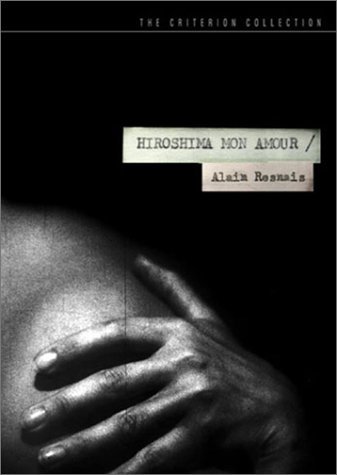
I never quite get the sense of what happened to poor Hiroshima in the WWII. I mean, I read about how the pearl harbor attack led to the decision of dropping bombs by Truman and hard facts like that, but Hiroshima is too distant a piece of historical memory to me. I wish there were more near-distanced, perceptible experiences available to me, whether visual or cognitive kinds like this one. Sometimes I daydreamed about landing on Hiroshima one day, with a suitcase and my laptop, ready to bitch about how my footprint matters to no one in and out of Hiroshima except the ego in my mind.
It was against this estranged backdrop that Hiroshima Mon Armor stands out from the ocean of foreign movies on romantic affairs. It bestows this tragic place a romanticized flavor to sustain your interest in the heavy discussion of technology-assisted world conflicts. This is delicately achieved by adept fornication: the fleshy display of epidermic communication as you can see in the poster. While lighting and hand gesture made the posture quite questionable, the bodily contact was smoothly shot in the motion picture, simply natural and aesthetic. It was shot in the black and white era so the sex portrayal was filmed in a more non-explicit way, compared to the level of acceptance nowadays: no disclosure of any testicles for example. Yet the element of intimacy is not undermined by the cinematographic obscurity; in fact the subtlety allows more room for imagination: you can picture how the union of the two spirits are conjoined in the union of their body parts, and the soft play of human affairs is interjected with the heavy part of world politics, all in your mind. What replace the flavorless type of licentious, hard-core porno stuff is an unlimited internal capsule.
All movies are romanticized representations of an insipid snapshot one way or another, or they are not movies. True, but Hiroshima Mon Armour is a “romanticized” account in the literal sense: a trans-continental hiccup of a love affair between trans-racial, trans-cultural couple. A married French actress hooked up with a married Japanese ambassador in post-war Hiroshima. As the woman revealed her past in Nevers, France and what she saw around social spaces in Hiroshima, the filmroll slowly took us to a new territory where Nevers met Hiroshima as their bodies were enmeshed in each other. The distant history of the two places became relevant and interesting now as the public dossier is entangled with the private union of two individuals. The intersection between private and public facets is sprinkled with mind-boggling but lovely philosophical lines like this one
"just as the illusion exists in love, the illusion you can never forget, so I was under the illusion I would never forget Hiroshima, just like with love."
Hiroshima Mon Armou is an embodiment of pure aesthetics, delusion, and disillusion. Ironically, or better say, superbly, it is through the deconstruction of the delusion of love that comes that disillusion of war history and love affairs.
No comments:
Post a Comment